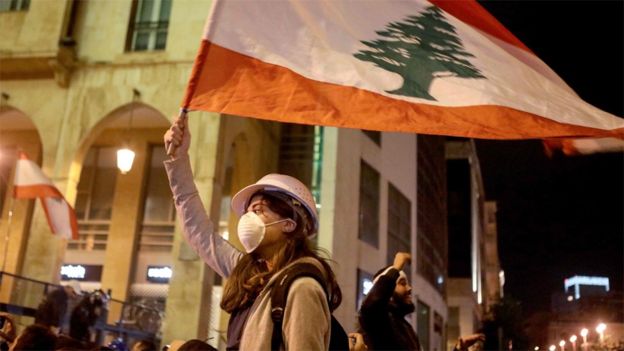Iran's Axis Imploding
"Sayyid [Hassan Nasrallah, Hezbollah leader] means a lot to me. There are thousands who admire him, but I'm like Number 100 on the list."
"Please help us [video of apology for denouncing Nasrallah]. Really, we're starving ... We don't have jobs."
Lebanese Shiite
"Hezbollah has never prioritized bread-and-butter issues, but suddenly they're faced with a community that's basically saying, bread and butter are a priority."
"It's now part of a government that's corrupt, and they can't blame others for the corruption; they're part of the corruption equation."
Randa Slim, Lebanon analyst, Middle East Institute
 |
| Anti-government demonstrators rally behind barbed wire in downtown Beirut on Jan. 25. Anwar Amro/AFP/Getty Images |
"The [military security] officer was forcefully raising my arms above my head, and another came on a motorcycle and hit me in the back. I felt a pop in my back.”Since October 17 when the protests in Lebanon first began, hundreds of protesters have been injured in the melees between themselves and the military, and hundreds more have been imprisoned. Unlike protests taking place in Iraq, however, where hundreds of people are known to have been killed and thousands injured, there have been no such reports in Lebanon. They decry their corrupt government and their dire living conditions. They want a change in government hoping that things will change for them; employment, opportunities, affordability of the basic necessities of life.
“They would take us outside of the [prison] building; we felt air as if we’re in an open space [blindfolded]."
"Suddenly, someone comes over and tells us to kneel, pushing us to the floor … reloads a Kalashnikov over our heads, waits a bit, then takes us back inside.”
Basal, Lebanese protester, among hundreds taken into custody
Where four people have died in Lebanon during the protests and the clashes, over 600 were killed in Iraq and in Iran at least 1500 protesters lost their lives. Iranians are desperate for a change in government, to be able to live their lives more freely, with prosperity and hope for the future, denied them by a government that invests in terrorism in support of a murderous regime in Syria where a half-million have died in almost a decade of civil war. Iran's Shiite axis of Syria, Iraq, Lebanon and Yemen is in poor health.
Basically, Iraq and Lebanon want a lot less of the Islamic Republic of Iran ordering their lives and their governments. An echo from Iranians themselves. And for all of them, the protests are of little avail.
Lebanese Shiites, loyal to Hezbollah and its leader, have turned critical of both. Hezbollah loyalists caught on television denouncing its leader in the early days of the uprising in Lebanon are now contrite; they have been warned to cease and desist. And because of that they have reappeared on television to counter their initial criticism of the leader of the terrorist militia which has achieved power in government, of a corrupt and failing country.
In Lebanon, of the 18 recognized religious sects, the Shiites represent the largest, dependent on Hezbollah for protection, employment, social services and a group loyalty in a shared struggle against enemies, principally Israel. Now entering its fifth month, Lebanon's disruptive protests that have roiled government have brought in people from all backgrounds united in their detestation for leaders incapable of guaranteeing their basic needs; a functional economy, good governance, reliable electricity.
For Shiites who joined in the protests and bitterly blamed Hezbollah for failing them, it represented a total rethink; how to be loyal to Hezbollah and critical of the government at the same time when Hezbollah now is the government? "I support resistance against Israel", declared 51-year-old Ali Ismail in Kafr Rumman, south Lebanon long dominated by Hezbollah and Amal the other Shiite power. "But I also support resistance against corruption", he added. He lacks party connections, and so is shut out of favouritism by either Shiite party.
In the early stage of the protests, Nasrallah told his supporters to go home. His words carry weight, his supporters believe Nasrallah is heroically responsible for having run Israel out of the country, after its 18-year occupation of southern Lebanon. He is considered personally incorruptible; Hezbollah and its allies dominated the government which resigned in October, as it does the new cabinet formed to take the place of the old one, in January.
Both Hezbollah and Amal followers have beaten protesters with sticks and fists. Threatening calls, anonymous What'sApp warnings of a "negative impact on your life", or visits telling those known to take part in protests, to stop protesting, by party representatives have troubled protesters. The protests, insinuates Hezbollah, are in reality a foreign-led conspiracy against Shiites, amply belied by the fact that the protesters are friends, neighbours and relatives.
"People used to watch Nasrallah's speeches without asking questions. But now, even though they still support him, they've started asking questions", Ihab Hassane, 29, a Shiite protester from Tyre explained. He is among those who have lost hope in Lebanon, planning to leave and go abroad. If the protests have accomplished anything, he believes, it has been to question the value of Hezbollah and Nasrallah to the Shiite community that supports it.
 |
| Protesters in central Beirut were quick to reject the new government EPA |
Labels: Corruption, Hezbollah, Lebanon, Mass Protests, Poverty, Violence

<< Home